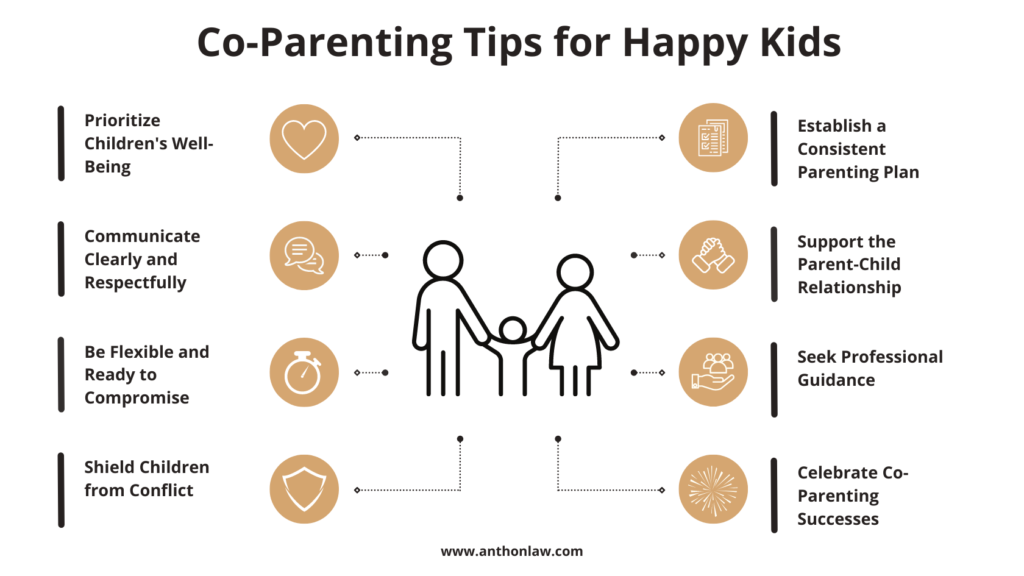How To Co-Parent in Idaho
Divorce brings about profound changes, particularly when children are in the picture. Transitioning from marital partners to co-parents entails directing a new and often complex relationship dynamic.
Based on my years of experience as a family law expert in Idaho, I’ve witnessed the impact a well-structured co-parenting approach can have on families. To assist in this transition, I offer an in-depth exploration of eight essential strategies for fostering a positive and effective co-parenting environment. Here are eight helpful tips for parents creating a co-parenting plan in Idaho.
1. Put Your Children’s Well-Being Above All
The success of co-parenting hinges on a unified commitment to prioritize the well-being of your children. This principle exceeds the dissolution of a marriage, emphasizing both parents’ ongoing responsibility to ensure their children’s security and happiness.
A child-centric approach helps cushion divorce’s emotional upheaval, promoting resilience and stability in your children’s lives.
2. Use Clear and Respectful Communication
Clear, respectful communication forms the bedrock of successful co-parenting. Cultivating a communication style marked by professionalism, neutrality, and focusing on constructive outcomes is very important.
Include tools and practices that increase clarity and reduce potential conflicts, such as shared calendars for scheduling and digital platforms for discussing child-related matters, ensuring a smooth flow of information regarding your children’s lives.
3. Develop and Adhere to a Consistent Parenting Plan
A consistent parenting plan is fundamental for providing children stability across both households. Collaborate to outline routines, disciplinary approaches, and shared expectations, covering all aspects from daily schedules to decision-making protocols regarding education and health care.
Such consistency eases the adjustment to new family structures, offering children a sense of predictability and safety.

4. Flexibility and Compromise
Life’s unpredictability demands flexibility in co-parenting arrangements. The willingness to adapt and compromise, whether in response to unexpected events or to accommodate special occasions, is key to a harmonious co-parenting dynamic.
This flexibility serves your children’s best interests and models positive behavior in problem-solving and adaptability.
5. Protect Your Children from Conflict
Insulating your children from disagreements or negative sentiments towards your co-parent is critical. Children should be spared from conflict and the pressure of taking sides.
Address any disputes privately, ensuring that your children retain the positive views of both parents, which is instrumental in preserving their emotional well-being.
6. Encourage Relationships with Both Parents
Actively encourage and support your children’s relationship with your co-parent. Facilitate communication and visits, share positive anecdotes, and allow your children to express affection freely towards both parents.
Such encouragement benefits your children and lays the groundwork for a cooperative co-parenting relationship.

7. Utilize Professional Resources
The complexities of co-parenting sometimes necessitate external support. Seeking guidance from therapists, mediators, or co-parenting counselors can offer valuable strategies for enhancing communication, resolving conflicts, and managing emotions.
Additionally, consulting with a family law attorney can clarify the legal dimensions of co-parenting agreements and ensure that your arrangements serve your children’s best interests.
8. Acknowledge Co-Parenting Achievements
Recognize the milestones and successes within your co-parenting journey. Celebrating these moments, no matter their size, reinforces the positive aspects of your new dynamic.
Celebrating achievements, from transitions between homes to effective conflict resolution, fosters motivation and underscores the value of your efforts in building a nurturing environment for your children.
Need Professional Help?
Adopting a strategic approach to co-parenting post-divorce is paramount in safeguarding your children’s welfare and ensuring their emotional and psychological health.
By prioritizing their needs, maintaining open and respectful communication, and embracing flexibility, you lay the foundation for a successful co-parenting relationship.
As an experienced family law attorney in Idaho, I am committed to supporting families through this pivotal transition, providing legal counsel and compassionate guidance. Together, we can navigate the co-parenting landscape, ensuring a positive outcome for you and, most importantly, for your children. For more information, fill out a form or call: (208) 274-3741




